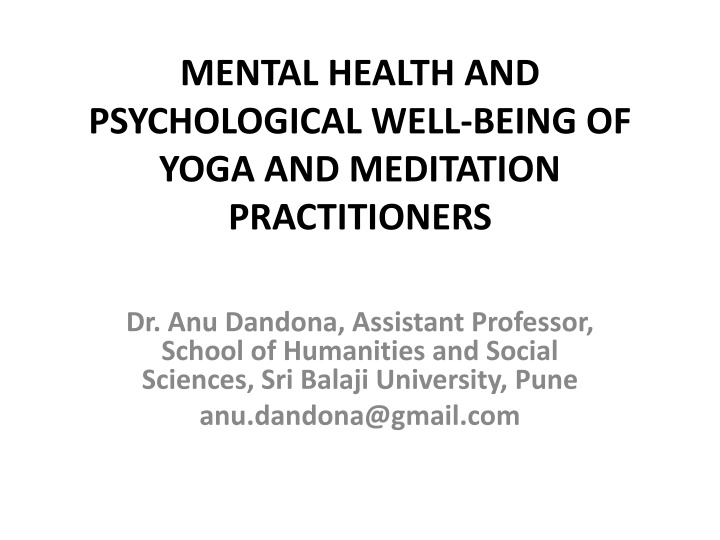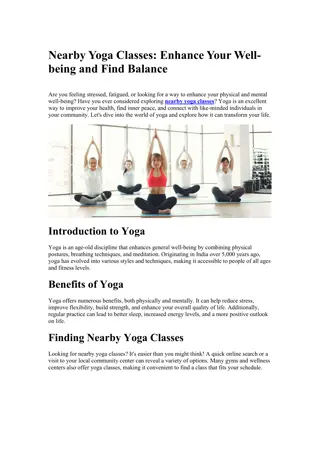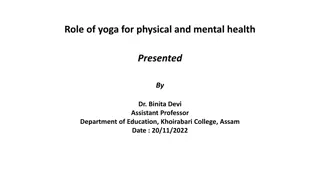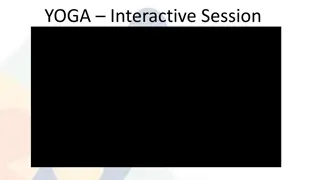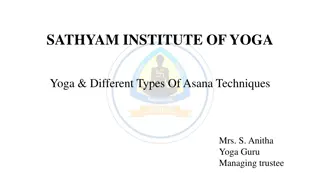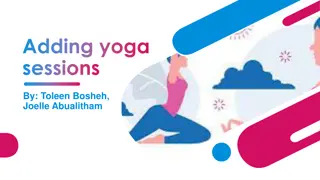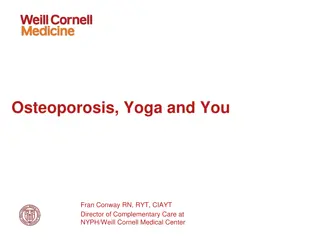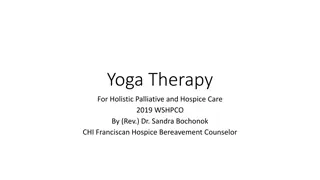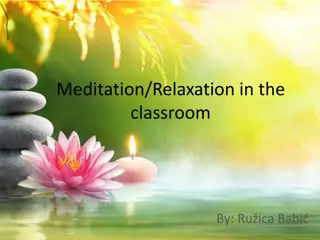Study on Mental Health and Psychological Well-being of Yoga and Meditation Practitioners
This study conducted by Dr. Anu Dandona aims to assess the psychological well-being and mental health of yoga and meditation practitioners. It compares practitioners based on gender, explores their well-being, and involves 200 adult participants. The research used tools like the Mental Health Inventory and Psychological Well-being Scale, with data collected through questionnaires distributed in yoga and meditation camps. SPSS software was used for statistical analysis.
Download Presentation

Please find below an Image/Link to download the presentation.
The content on the website is provided AS IS for your information and personal use only. It may not be sold, licensed, or shared on other websites without obtaining consent from the author.If you encounter any issues during the download, it is possible that the publisher has removed the file from their server.
You are allowed to download the files provided on this website for personal or commercial use, subject to the condition that they are used lawfully. All files are the property of their respective owners.
The content on the website is provided AS IS for your information and personal use only. It may not be sold, licensed, or shared on other websites without obtaining consent from the author.
E N D
Presentation Transcript
MENTAL HEALTH AND PSYCHOLOGICAL WELL-BEING OF YOGA AND MEDITATION PRACTITIONERS Dr. Anu Dandona, Assistant Professor, School of Humanities and Social Sciences, Sri Balaji University, Pune anu.dandona@gmail.com
Objectives The objectives formulated for the study are- To assess the psychological well-being and mental health of yoga and meditation practitioners. To compare the psychological well-being and mental health of practitioners. To compare the psychological well-being and mental health of practitioners in terms of gender. To explore the psychological well-being and mental health of yoga and meditation practitioners. yoga and meditation yoga and meditation relationship between
Participants The participants for the study included a total of 200 adult individuals. The participants for the research were recruited by means of purposive sampling technique. All the participants were controlled on the domain of age, gender, and practices they followed. Out of 200 participants, 100 practiced yoga, and remaining 100 respondents practiced techniques. Further, the participants were bifurcated in terms of gender i.e. 58 male yoga practitioners, 42 female yoga practitioners, practitioners and 57 female meditation practitioners. meditation 43 male meditation
Tools Used Demographic Data Sheet The demographic datasheet was prepared in accordance with the requirement of the study. It comprised of details like Practice followed (Yoga or Mediation), Age, Gender, Qualification, and Marital Status. Mental Health Inventory The Mental Health Inventory, constructed by Dr. Jagdish and A.K. Srivastava was administered to assess the status of Mental Health among the respondents. It is a 56-item tool that assesses mental health on six dimensions i.e., Perception of Reality, Positive Self Evaluation, integration of Personality (IP), Autonomy, Group Oriented Behavior, and Environmental Mastery.
Psychological Well-being Scale The Psychological Well-being Scale, constructed by S. Bhogle and Jai Prakash was administered to assess various domains of Psychological Well- being among the respondents. It is a 28-item scale with True-False responses.
Procedure The dataset for the study was acquired by means of questionnaires. The questionnaire and demographic datasheet were circulated among 250 respondents through various organizations conducting yoga and meditation camps. A total of 230 responses were received and out of which 200 responses are being utilized for data analysis. 30 responses were discarded because of missing item responses. The statistical analysis of the final dataset was done by means of SPSS software.
Results And Interpretation The dataset was evaluated and tabulated in accordance with the objectives to arrive at the relevant inferences by using the Means, SDs and t for dimensions of Mental Health (MH) and Psychological Well-being (PWB) on the aspects of Gender and Practices followed by the respondents. The Correlation among the variables and their dimensions were also computed. The findings from the analysis of dataset are depicted in tabular form and the results from each are summarised as follows-
Table-1: Means. SDs and t of yoga and meditation Practitioners on mental health Standard Variables Practices N Mean t-value p-value Deviation Yoga 28.941 3.204 103 Positive Self Evaluation (PSE) 3.252 0.001 Meditation 30.247 2.441 97 Yoga 25.689 5.345 103 Perception of Reality 7.037 0.000 Meditation 29.835 2.600 (PR) 97 Yoga 28.242 3.276 103 Integration of 4.436 0.000 Meditation 30.082 2.564 Personality (IP) 97 Yoga 25.068 5.187 103 Autonomy (A) 4.586 0.000 Meditation 27.680 2.477 97 Yoga 26.417 2.669 103 Group-Oriented 5.107 0.000 Meditation 28.474 3.003 Behavior (GOB) 97 Yoga 30.475 2.342 103 Environmental 6.022 0.000 Meditation 27.979 3.391 Mastery (EM) 97 Yoga 164.543 11.874 103 Total Mental Health 7.016 0.000 Meditation 174.299 7.398 (TMH) 97
Table-2: Means. SDs and t of Yoga and Meditation Practitioners on Psychological Well- being Standard Variables Practices N Mean t-value p-value Deviation Yoga 103 21.4757 2.37571 Psychological Well- Being 2.115 0.036 Meditation 97 22.1959 2.43516
Table-3: Means. SDs and t of Male Yoga and Meditation Practitioners on Mental Health Standard Variables Practices N Mean t-value p-value Deviation Yoga 29.2759 3.28096 103 Positive Self Evaluation (PSE) 2.362 0.020 Meditation 30.5714 2.19914 97 Yoga 24.5517 5.72521 103 Perception of Reality 5.888 0.000 Meditation 29.5952 2.66009 (PR) 97 Yoga 28.1379 3.23603 103 Integration of 4.440 0.000 Meditation 30.5714 2.24307 Personality (IP) 97 Yoga 22.9138 5.82278 103 Autonomy (A) 4.865 0.000 Meditation 26.9524 2.09474 97 Yoga 26.0517 2.88628 103 Group-Oriented 3.574 0.001 Meditation 28.1667 2.94599 Behavior (GOB) 97 Yoga 30.6207 2.56034 103 Environmental Mastery 3.851 0.000 Meditation 28.2857 3.27061 (EM) 97 Yoga 161.0345 12.31027 103 Total Mental Health 6.811 0.000 Meditation 174.1429 6.76999 (TMH) 97
Table-4: Means. SDs and t of Male Yoga and Meditation Practitioners on Psychological Well- being Standard Variables Practices N Mean t-value p-value Deviation Yoga 20.9483 2.63860 103 Psychological Well- Being 2.899 0.005 Meditation 22.4286 2.43093 97
Table-5: Means. SDs and t of Female Yoga and Meditation Practitioners on Mental Health Standard Variables Practices N Mean t-value p-value Deviation Yoga 28.5111 3.08679 103 Positive Self Evaluation (PSE) 2.573 .010 Meditation 30.0000 2.60342 97 Yoga 27.1556 4.45664 103 Perception of Reality 3.822 .000 Meditation 30.0182 2.56393 (PR) 97 Yoga 28.3778 3.35944 103 Integration of 2.137 .032 Meditation 29.7091 2.74653 Personality (IP) 97 Yoga 27.8444 2.11010 103 Autonomy (A) .829 .409 Meditation 28.2364 2.61735 97 Yoga 26.8889 2.30831 103 Group-Oriented 3.392 .001 Meditation 28.7091 3.05307 Behavior (GOB) 97 Yoga 30.2889 2.04075 103 Environmental 4.537 .000 Meditation 27.7455 3.49189 Mastery (EM) 97 Yoga 169.0667 9.66343 103 Total Mental Health 2.986 .003 Meditation 174.4182 7.90380 (TMH) 97
Table-6: Means. SDs and t of Female Yoga and Meditation Practitioners on Psychological Well- being Standard Variables Practices N Mean t-value p-value Deviation Yoga 22.1556 1.79590 103 Psychological Well- Being .314 .747 Meditation 22.0182 2.44564 97
Table-7: Correlation Matrix for Mental Health and Psychological Well-being of Yoga and Meditation Practitioners. Psychological Perception of Total Mental Positive Self Environment Integration Personality Well-being al Mastery Evaluation Autonomy Oriented Behavior Group- Reality Health of Positive Self Evaluation .228** .019 .090 .065 .066 .413** .305** 1.000 .001 .788 .203 .359 .351 .000 .000 Perception of Reality -.121 .627** .379** -.117 .773** .615** 1.000 .089 .000 .000 .098 .000 .000 Integration of Personality .001 -.097 -.075 .168* .017 1.000 .983 .172 .291 .017 .808 Autonomy .273** -.019 .775** .599** 1.000 .000 .787 .000 .000 Group-Oriented Behavior -.079 .527** .358** 1.000 .263 .000 .000 Environmental Mastery .190** .305** 1.000 .007 .000 Total Mental Health .769** 1.000 .000
Limitations The current study adopted rigorous methodology for assessing the status of mental health and psychological well-being meditation practitioners. Although the study possesses various strengths, yet few limitations exist as well. The limitations of the study could be outlined as- utilization of broader context of yoga and meditation instead of specific domains. Another limitation of the study lies in the smaller size of the sample. Apart from these limitations, inclusion of only mental health and psychological well-being in the study objectives limits the variables for the study. among yoga and
Scope for future research This study was conducted with the aim of filling the lacuna in literature pertaining to the status of mental health and among the yoga and meditation practitioners. Future research could be elaborated through inclusion of other variables Moreover, bigger sample techniques used in yoga and meditation practices could be included for more intricate research. Future research could also incorporate mixed method design. psychological well-being in the study. specific size and
